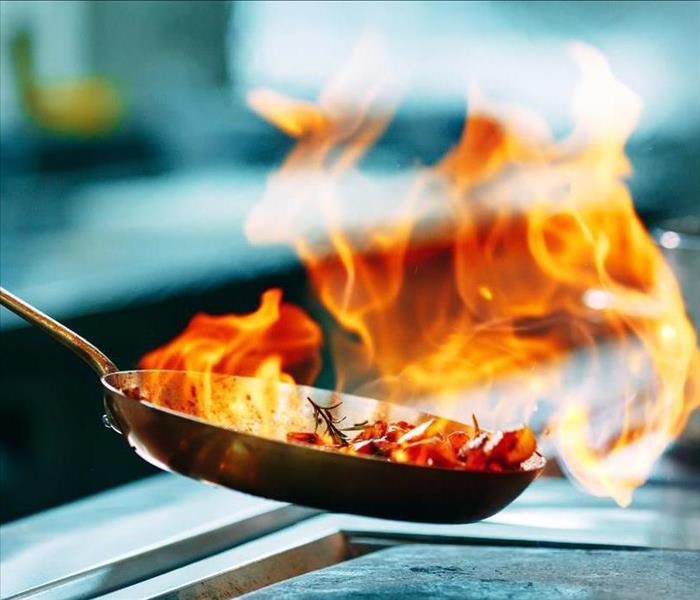Avoiding Kitchen Fires in Your Home
6/1/2022 (Permalink)
 Cooking is the leading cause of home fires, accounting for an estimated half of reported home fires.
Cooking is the leading cause of home fires, accounting for an estimated half of reported home fires.
People often refer to the kitchen as the heart of the home. It’s the place where families congregate and satiate. Think about how much time your family spends in the kitchen. Since the kitchen plays a vital role in our lives, it is imperative to make it a safe space. Your kitchen may pose a great risk to your family. In fact, cooking is the leading cause of home fires, accounting for an estimated half of reported home fires.
According to the National Fire Protection Association (NFPA), United States fire departments responded to approximately 172,900 home fires per year in the previous few years resulting from cooking. These fires caused more than $1 billion in direct property fire damage per year.
The following steps will help you to be proactive in protecting your home and family from kitchen fires.
Never Leave Cooking Unattended
The NFPA lists unattended cooking as the leading cause of cooking fires and deaths. The best advice is to only cook when you actually have time to cook. Never put something on the stove while tending to other activities. Moreover, you should never leave the home while your oven is on. When cooking on the stove or in the oven, always set a timer.
Install and Test Smoke Alarms
While smoke alarms do not prevent home kitchen fires, they are an excellent precaution. Your smoke alarms should double as carbon monoxide (CO) detectors. One type of alarm will not substitute for the other. It is essential to have both or a combination alarm. Make sure smoke alarms are UL rated, well-maintained, and properly installed. New smoke alarms have a sealed 10-year battery that is non-replaceable and non-removable. If you are using a smoke alarm with removable batteries, change them twice per year. Install alarms on every level of your home, including basements, and where you sleep. Test alarms and clean regularly by dusting or vacuuming.
Fire Safety Equipment
In addition to smoke alarms and carbon monoxide detectors, equip your kitchen with a fire extinguisher. Read the directions and check on a monthly basis to ensure you are prepared to use it in an emergency. Ensure you are knowledgeable about when and how to use a fire extinguisher. It is important to note that most kitchen fires should NOT be doused with water. The majority of home kitchen fires initiate from grease or electrical appliances. Water will make a grease or electrical fire worse. The best way to put out a kitchen fire, other than when an extinguisher is used, is to cover the fire with either a lid or baking sheet, or by pouring a box of baking soda on top.
Keep Flammable Items Away from the Heat
Clear your workspace prior to starting each time you cook. Dishtowels, oven mitts, paper products, etc. should never be near your heat source. Loose-fitting clothing poses a similar risk; roll up sleeves and tuck in flowy articles of clothing prior to the start of cooking. A flammable object can cause a home kitchen fire even if it is not making direct contact with the flame. Always keep your cooking areas clean and free of clutter.
Cooking Temperatures
Be mindful of cooking temperatures, particularly when using oil for frying foods. Stay cognizant of the flashpoint, when the oil is hot enough to ignite on its own.
Escape Plan
Think about your fire escape plan. In an emergency, thoughts can be unclear and panicky. Your escape route should be well thought out and practiced. Consider all scenarios to best prepare your family.
When in doubt, evacuate your home, close all doors on your way out, and call 911. Fire departments are best equipped to deal with an emergency fire situation. It is important to act quickly to minimize fire damage. Above all, most home kitchen fires are preventable. Keep the heart of your home and your precious family safe by proactive preparation.

 24/7 Emergency Service
24/7 Emergency Service